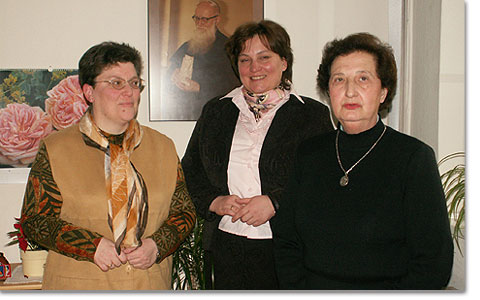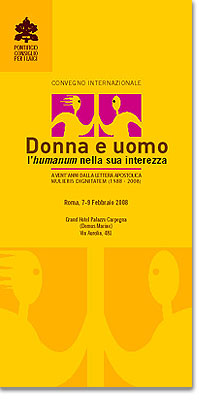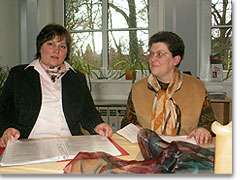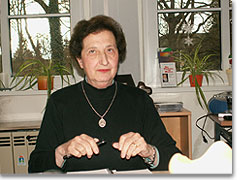
|
Participantes del congreso en Roma: Marianne Mertke, Alicja Kostka, Perla Pionera, de la Federación de Mujeres Participants of the congreso in Rome: Marianne Mertke, Alicja Kostka, Perla Pionera, of the Women’s Federation Teilnehmerinnen des Kongresses in Rom: Marianne Mertke, Alicja Kostka, Perla Pionera, alle drei aus dem Schönstatt-Frauenbund Foto: POS Fischer © 2008 |
 |
|
Afiche del congreso Congress Poster Poster des Kongresses Foto: Laienrat © 2008 |
|
 |
|
Alicja Kostka (izq.), Polonia, y Marianne Mertke, Alemania Alicja Kostka (left), Poland, and Marianne Mertke, Germany Alicja Kostka (l.), Polen, und Marianne Mertke, Deutschland |
|
 |
|
Perla Piovera, Mendoza, Argentina Perla Piovera, Mendoza, Argentina Perla Piovera, Mendoza, Argentinien Fotos: POS Fischer © 2008 |
|
Fotos: © 2008 |
ROME, mkf. The Pontifical Council for the Laity has organized the congress "Man and Woman, the Human Totality" between the 7th and the 9th of February on the 20th anniversary of Pope John Paul II’s Apostolic Letter Mulieris Dignitatem (dignity of the woman). The 260 participants are from 49 countries from the five continents. There are delegations from 40 Episcopal Conferences, representatives from 28 Movements and New Ecclesial Communities, 16 Catholic Associations of Women, 9 Women’s Religious Institutes and women leaders from various cultural aspects. Among them are four Schoenstatt women from four different countries: Perla Piovera from Argentina, Alicia Kostka from Poland, Marianne Mertke from Germany, and Sr. Elena Lugo from Puerto Rico as a member of the Pontifical Academy for Life. A lively interview took place at the Schoenstatt Press Office with the three representatives from the Women’s Federation on Monday, February 4th.
During the three-day conference, a balance sheet for the last twenty years will be made and they will come face to face with the actual challenges in light of John Paul II’s document which was the first document in history dedicated to Woman by a Pope. The participation of woman in the mission of the Church and society, and the relationship between man and woman will be topics which will be at the center of the International Congress promoted by the Pontifical Council for the Laity on the 20th anniversary of the publication of the Apostolic Letter Mulieris Dignitatem. The topics which will be particularly the object of attention will be: maternity and paternity and the importance of both of these dimensions in the family and in the diverse circles of society; the balance between family life and work; the need for a greater presence of the woman in public circles and in the assumption of Ecclesial and civic responsibilities.
Alicia Kostka from Poland, two years ago did her doctoral thesis on the dignity and vocation of woman from the perspective of Father Kentenich. "It is the topic of my life," she says and, therefore, wants to participate in this congress to see how they present it in Rome. "Twenty years after the Apostolic Letter Mulieres Dignitatem (MD), we want to see what has changed since then, what still has to be done; we want to evaluate the perspectives, the feminine identity, the vocation of woman. Since MD was published, I think the chaos of terms has grown in society; man and woman are defined according to whim. We want to deepen what is said in the Bible and Christian anthropology. Marianne Mertke, a member of the international leadership of the Women’s Federation, adds that as a community of professional single women, they have their own perspective of the topic and want to give their support.
Woman, reflection of a God who is also Mother
From the topics of the congress, what interests Alicia Kostka most is the conference entitled: Man and woman, created one for the other. "We should also be conscious of this in daily life," she says, "that both man and woman represent God, each in his/her own way. I am fascinated with how Father Kentenich presents this in his description of the woman as an image of God and how still today he is far more ahead than what the Church says…..how he concretely shows woman as an image of God. The Church in her doctrine is still behind in showing woman as a person – as a person who loves, thinks, acts – woman as a person who reflects God. Father Kentenich is much more concrete in showing how she is a reflection, an image of God as woman, that is, an image of God who is also Mother in her unselfish surrender. Rarely is this found in the theology of woman, unselfish service as a natural gift of the woman…..as the strength of woman, is being a reflection of God who serves us because He is strong and because He is love. The woman as His image, as mother, can be strong and unselfish because she reflects God in his service. Another topic from Father Kentenich which fascinates me is the role of woman in the salvation of man. It is the feminine principle which woman represents. It is what Father Kentenich calls the attitude of the Fiat, the attitude of saying "yes." If the woman develops it in herself, she can also help the man to reach that attitude before God. In summary: Father Kentenich has contributed a great deal so that woman can be proud of being a woman."
When woman has to think and act in masculine categories
"Already in the 1930’s, Father Kentenich presents the topic on what happens with woman when she adapts to a great extent to masculine principles. He asked: where is the feminine strength which can contribute even more? Who spoke of this in the Church in the 1930’s?"
"He was a feminist," says Alicia Kostka smiling. "But in the most positive sense. Until today, the woman still directs herself on the scale of masculine values. We guide ourselves on the masculine concept of the woman and we have internalized it without realizing it. Because of it, we are not ourselves. We are not what we could be according to God’s idea and how the man would need us. Father Kentenich said this already 70 years ago. It is a program for the liberation of woman. The liberation of her orientation on the scale of masculine values."
A feminist, yes, adds Marianne Mertke. A feminist who not only offered a theory but also the application to life and one who speaks of being which is what can guide in a time filled with the chaos of definitions chosen by chance.
The middle-of-the-road discussion, the popular discussion on woman and the Church, nevertheless, centers on the power of woman. "It is true. We women, in part, are still searching for our place in the Church," confirms Alicia Kostka, "and it is not always easy. But it does not deal with the perspective of power. This is a bad perspective, also for the male. The power of service which the woman has, she herself often misunderstands as weakness. But only whoever is strong is able to serve. All mothers know that. What vigor is needed to educate well the children and to love the husband!"
"I am interested in the topic of what has changed and what has developed in the past twenty years," says Marianne Mertke pointing to another central topic of the congress. The Archbishop of Toledo (Spain), Cardinal Antonio Cañizares, will speak on "the balance and perspectives of the reflection on woman, twenty years since the Apostolic Letter Mulieris dignitaten."
"There is another topic which speaks of the presence of woman in the history of the Church…..of women saints, foundresses, of women in social projects, of women missionaries. This will also be very interesting!"
What do you think can be contributed from Schoenstatt? "It is Mary," says Marianne Mertke, "Mary as a woman, as a living guide for all women who seek direction." For Schoenstatt, she adds, it would be very good to again make sure of its mission for woman. "For me, the Sign of Light Association is a manifestation of the feminine answer to the challenges of the times. These women do something concrete for the solution to the great problems of society by serving others." For Alicia Kostka, the "Day of the woman" is another "pearl" where Schoenstatt gives its support to women. "When one sees how the women at the "Day of the woman" discover themselves and their values…..this for me is pure Gospel." But she has, as also Marianne Mertke has, the hope that the topic "woman" will have a prominent place in Schoenstatt. "Right now, everything seems to center on the topic of the family which is good, but I think it is important to also deepen anew the topic of woman."
Being woman is a mission
Perla Piovera from Mendoza, Argentina is grateful for the invitation to participate in this congress. "For many years I have been interested in the topic of woman and I also work with it. It seems to me that this congress points to a central challenge of life in today’s world and to which the Church should respond as John Paul II says in the MD Apostolic Letter. What is at play with this topic is not only the problem of woman but of the destiny of humanity. I have been in Schoenstatt for many years and I have been able to discover in our Father the importance which he gives to this topic; not to the topic as such, but at woman’s formation…..the formation of woman which reaches the height of Mary. It seems to me that in this, Schoenstatt makes a very important contribution. Not only in theory, in speaking of important topics, of deepening them, but that Father placed in the center the person of Mary and even more so, the covenant with Mary.
He gives woman today not only a theory but life! He makes it possible for the image which God had for the feminine when he created man and woman to come forth. I am always impressed that the entire concept Father had about woman…..all he tells us about woman…..all he gave to us about woman…..has not been born from a theory but from his encounters with many women from all ages and from all circumstances of life and from the encounter with The woman who is Mary and who is the soul of his soul.
His, as direction…..mission…..vocation, comes from a very profound encounter with the truth made flesh. The congress has very good, wonderful, and red-hot topics; for example, man and woman created for each other. It is a red-hot topic. In reality, at this time, we seem more like enemies, not made for each other, but face to face with each other. In this way, the basic cell of human society breaks and then there is no possibility for human life. It seems like a jungle! There is no family, there are no children: the future of humanity is gambled on this topic. It is important. I like to see this in the context of contemporary cultural problems. If we would speak – a German, an Asian, an Argentinean, an African – it would not seem that we would have the same problems. But in the final analysis, it is a mentality which separates, which breaks the man-woman relationship, the social relationship in the sense of the concept of gender. It has transformed into a mentality without our being aware of it. It has gotten into politics, into society, into individual mentality, into the family. For that reason I think this congress is very important. But it should formulate a pedagogical proposal for the formation of today’s Christian woman. Which formation corresponds to this? I think Schoenstatt can contribute a great deal."
What are the concrete tools which Schoenstatt has to offer? Perla Piovera answers: "I speak of my experience. It is easier! The first bond is the encounter with the Shrine. Not so many words. Words are not convincing today. The encounter with Mary in the Shrine.
Secondly, the organization we have: groups, different forms of belonging and also having experiences and sharing them; the work in small groups where it is possible to share since this is not possible in large groups.
Also, the tendency to be able to open up to others, to other Church groups or persons who are not in Schoenstatt and they receive this very well." She relates about an initiative in Mendoza: "In Mendoza, we have a study group on woman composed of representatives from all of the Schoenstatt feminine communities in Mendoza. Each year we study a topic. At the end, we organize a general encounter. It is incredible how many people come and how the topic is received. Many persons are open because they are frightened by all that is happening. The closing of these encounters is a moment of prayer in common. They especially ask for it. It is a profound need of the woman to again encounter the religious. It is a permanent petition.
We evaluate the whole encounter. What they value first is the encounter with God. There is a moment of prayer in the Shrine, a little time with Mary…..they also like the ideas, the examples and the exchange, but what is most important is prayer. Woman is naturally religious. I think that the order of acting returns to the order of being.
In the same line, there is another experience I deduce from these encounters and many observations: Woman needs times of rest. I speak of the Argentinean woman, I cannot speak about the whole world. It would seem that woman is tired of struggling. She wants to be a perfect mother, a perfect wife, a perfect professional person. The demands, the tasks are so many that she needs a tranquil period. A tranquil moment is a gift, they say! It seems an untruth because it is so simple, but it is the truth. This corresponds to all of this, to the break in the order of being.
This is what Father said so prophetically already in the 1920’s. Father motivated woman to go and work, to be involved in politics. He saw in the femininity of the time a sign from God. You cannot go back as is said in the Pre-founding Document. We cannot dream with change and return to the past without having to work for the formation of woman being woman for the present times and to give woman the right to be woman.
In our times where so much is said about human rights, we forget the basic rights. Return to woman the right to be woman! It does not mean that she should not work, that she not be a mother, but that she be woman. Father says that to be a woman is a mission. It seems craziness. One is a woman, what to do? It is the truth: to be a woman today is a mission."
Since it is good to participate in Schoenstatt, to take the pulse of the Church, she adds, it should also be asked: What can we receive as Schoenstatt? Or, as Marianne Mertke says, where are there possible covenants?
"May the awareness that we have a mission grow in us," is what Perla Piovera desires for Schoenstatt as a fruit of the congress. "We have received so much and now ‘gifts are tasks.’ Each woman embodies in herself a ray of the beauty of Mary: this has pedagogical power. It is something visible. It is not an idea but a reality made flesh. We have to share it. The lack of symbolic organic thinking is tiring and it especially tires woman! That she has to think like a male is tiring! She has the right to be a woman….."
For Alicia Kostka, it is important to continue helping women to grow in self-esteem as women. "It is not a topic for science. It is a topic for life and Schoenstatt is for life!"
"That the woman can once again learn to love with tenderness," is one of Perla Piovera’s wishes. "She cannot do this competing and running all of the time. Time to love with tenderness, time to create family is needed."
After the congress, they hope to share their experiences with the Schoenstatt Family.
Sr. M. Elena Lugo from Puerto Rico is among the speakers at the congress. She will speak on the Problems and Contemporary Cultural Tendencies Panel on the topic: "The rejection of maternity and family."
On Saturday, February 9th, the participants had an audience with Pope Benedict XVI.
Translation: Carlos Cantú Family Federation La Feria, Texas USA 021108